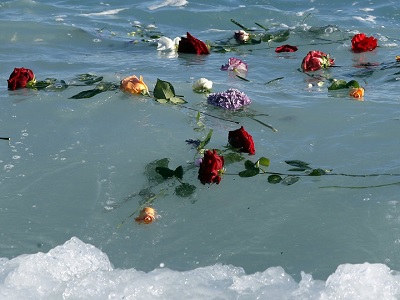
By Romana Rubeo
When I was a teenager, I had a poster adorning my bedroom wall:
“A people without memory are a people without a future.”
I always loved to believe that, somehow, “Historia magistra vitae” is a comforting formula. It would be nice to think that the historical memory is somehow useful to celebrate and keep with us the deep values of humanity and to erase the horrors of the past.
It would also be comforting to think that the “Remembrance Day” is not an exercise in empty, slick rhetoric, but an important opportunity to put the true protagonist at the center of the stage, at the heart of history: the human being, regardless of race, gender, skin color or religion.
In mid-January, a group of Italian students, accompanied by the Minister of Education, Valeria Fedeli, went to Auschwitz: it is the so-called “Journey of Remembrance”, organized by the Italian Ministry in collaboration with the UCEI (Union of Italian Jewish Communities) and the Department for Equal opportunities.
“When you come back, you are a different person”, the Minister said, “there is a change in your everyday behavior, in your values, in your sense of responsibility.”
The journalist who was covering the news commented with the usual oratory: “These initiatives are fundamental, so that these horrors will never happen again.”
Immediately after, I saw the face of Pateh Sabally. He is in the news due to the tragic nature of his death.
https://twitter.com/Daudoo/status/824728184902090752
Pateh was a 22 years old man; he fled Gambia and arrived to Italy two years ago, likely to escape a terrible fate.
His history is not entirely clear, the only certain thing is that Pateh decided to commit suicide; a possible reason is because the authorities didn’t renew his permit to stay in the country for humanitarian reasons.
He threw himself into the icy waters of the Grand Canal in Venice (an enduring symbol of the Italian “civilization” and the ideal nest for lovers.)
Pateh was drowning, while someone from the dock kept insulting him with racist comments and chanting “Africa” in order to mock him. Nobody tried to rescue Pateh as he died amidst total indifference.
In the meantime in Occupied Palestine, two stories emerged of similarly tragic ending as two teenagers faced the same, sad fate.
Qusay al-Hasan Umour, 17 is one of the last victims of an extra-judicial killing committed by the Israeli army. Qusay was shot dead during clashes in Tuqu village.
According to the autopsy, six bullets landed in his chest killing him instantly.
A video shows him several hundred meters away from Israeli soldiers, but this was not enough to ensure his safety, to escape his tragic destiny or to even avoid being dragged in the mud and humiliated after the shooting.
Qusay was assassinated, or should I say “neutralized”? Because the process of dehumanization also requires that words have to be selected very carefully, at least according to mainstream media.
Another victim is Ahmad Hassan Shubeir, also 17 years old.
Ahmad Hassan Shubeir heroically refused to snitch on his compatriots so Israel denied him a permit for medical care https://t.co/Bc1Our8uls
— Karen ?♀️ (@kazahann) January 25, 2017
Ahmad was born and raised in Gaza, and in addition to the difficulties faced by all pf those who live in that open-air prison, he suffered from a congenital heart defect.
Israeli authorities had denied him permission to leave the Strip in order to receive adequate medical care. Yet, Ahmad died a hero, for he refused to server as a collaborator in exchange for a permission to cross the borderline to receive medical treatment.
Too bad that not all heroes make headlines; some of them die amid the silence of the so-called international community, dragged in the mud and dust, or in a bed without care.
If there is any “history” that should be remembered, to make humanity better, should be the “history” of common people, of these human beings that were dehumanized by violence and indifference.
Aren’t these stories enough to make one “a different person, to change our everyday behavior, our values, our sense of responsibility”, in the words of the respected Italian Minister?
I don’t even want to mention the xenophobic sentiments that aren’t hidden anymore and that are becoming commonplace, to the point that our top politicians are not ashamed to target entire ethnic or religious groups.
I don’t even want to delve into the Islamophobic sentiment that is now part of our daily routine, now that the Muslims seem to be the new Jews, the new Sinti people, the new Romani people that populated the extermination camps – the new targets of violence and hatred.
I just want to speak of Pateh, Qusay and Ahmad. About all those who died amidst total indifference, while the world stood silently watching.
There is no doubt that “spirit of the killer” which has disturbed our “civilized” Europe in the 20th century is not dead; at least not yet.
The truth is that simply saying “never again” will no longer suffice. Because it is happening, again and again.
– Romana Rubeo is a freelance translator based in Italy. She holds a Master’s degree in Foreign Languages and Literature and she is specialized in Audio-visual and Journalism Translation. An avid reader, her interests include music, politics, and geopolitics. She contributed this article to PalestineChronicle.com.




